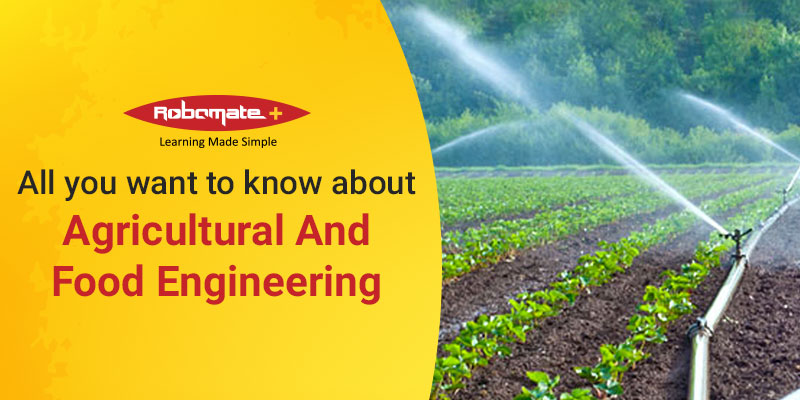What is agricultural and food engineering?
Agricultural and food engineering is a multidisciplinary branch of learning that combines microbiology, science and engineering education. The field includes activities like food processing, product packaging, ingredient manufacturing and control. An agriculture and food engineer employs innovative and advanced technologies to increase crop yield and helps the food industry by developing and ensuring required quality of processed products.
What does an agricultural and food engineer do?
An agricultural and food engineer is involved in agriculture and agro business and is dedicated to make farming environment friendly sustainable and technology driven. They also are engaged with the food industry. Agricultural and food engineers:-
- Analyze latest technology to enhance crop production with minimal use of resources and check excessive use of fertilizers, pesticides etc.
- Develop new technologies and machinery for the automation of agricultural practices. They also work to upgrade existing technologies to improve field preparation, plantation and harvesting.
- Aim to reduce loss of produce during plantation, harvesting and handling.
- Help in maximizing the sustainability and reliability of our food. They research about the safety and standards of food.
- Work towards improving food products, creation of new food products and work in close collaboration with the food industry for the overall development of the food we consume.
What subjects are taught in agricultural and food engineering?
Subjects taught in agricultural and food engineering is basically related to agricultural technologies and its application. The subjects mainly fall under three categories such as:
- Farm machinery
- Irrigation, hydrology, soil water and conservation engineering
- Food processing, agricultural process engineering and post harvest technology.
Courses taught in the branch are (may vary from university to university):-
- Engineering Mathematics:- Applied mathematics in the field of engineering
- Computer Technology:- Course on computer applications
- Engineering Physics:- Applied physics in the field of engineering
- Engineering Chemistry:- Applied chemistry in the field of engineering
- Production technology of field crops:- A course based on agronomy
Download Important Facts & Formulae for JEE
Besides these subjects, a student of agricultural and food engineering is also taught crop production technology, dairy and food engineering and aqua-culture engineering.
UG level agricultural and food engineering
- Duration: – 4 years.
- Entry requirements:-Students who wish to pursue agricultural and food engineering must have passed higher secondary board examination with mathematics, physics and chemistry. The students also need to appear for JEE mains (JEE advanced to study in an IIT) or any other state level engineering entrance examination.
- Colleges offering B Tech in agricultural and food engineering:-
- Indian Institute of Technology Kharagpur
- Colleges offering B Tech in food engineering:-
- National dairy research institute, Karnal
- Central food technology research institute, Mysore
- University of Delhi
- Karunya University, Coimbatore
- SRM institute of science and technology, Chennai
- Anand agricultural university, Gujrat
- University of Mysore
- Anna University, Chennai
- Tamil Nadu Agricultural university, Coimbatore
- Colleges offering B Tech in agricultural engineering:-
- Mahatma Phule Krishi Vidyapeeth, Rahuri
- Indira Gandhi Agricultural University, Raipur
- Rama University, Kanpur
- College of Agricultural Engineering & Technology, Bhubaneswar
PG Level agricultural and food engineering
- Duration: – 2 years.
- Eligibility Criteria: – Minimum score as required in the Graduate Aptitude Test in Engineering (GATE). Students who have studied B Tech in an IIT with a minimum CPI of 7.0 need not take the GATE examination.
After B Tech in agricultural and food engineering, students can opt for 2 years M Tech in 6 disciplines from Indian Institute of Technology Kharagpur. Alternatively, students can choose from various other institutes such as Birsa institute of technology, Dhanbad, College of technology Pantnagar, Assam University, Silchar, Indian agricultural research institute, New Delhi to study M Tech in Agricultural Engineering.
PhD Level agricultural and food engineering
- Duration:- Minimum 3 years for candidates with B Tech or M. Sc degree and minimum 2 years for candidates with M Tech or M.S degree.
- Eligibility criteria: – Candidates with B tech or MSc degree are required to qualify GATE. Alternatively, candidates can take the NET examination.
Doctoral degree or PhD is offered by Indian Institute of Technology Kharagpur. The PhD degree is awarded on the basis of satisfactory performance in course-work, seminars, thesis submitted by the student on his or her research and final viva-voce.
Skills required for an agricultural and food engineer
- Critical thinking: – An agricultural and food engineer needs critical thinking skills. He needs to assess and identify weaknesses and strengths of alternative solutions provided to him
- Complex problem solving: – Identifying complex problems and providing required information to develop productive solutions.
- Active listening: – Giving full attention to what people say, understand the problems and analyze the required area that needs to be worked on.
- Active learning: – Having a mindset to learn new things everyday related to the field and understanding the advantages of new information available for the update of current technologies and providing solutions to possible future problems.
- Systems analysis and evaluation: – Understanding the work of every part and component of machinery, analyzing the advantage and disadvantage, system performance and improving it for a better goal achievement.
- Reading comprehension: – Having a great knowledge of perceiving what is written in an official document and working accordingly to achieve the said goal.
Scope and Job opportunities for agricultural and food engineers
Other Engineering Courses in India
India is primarily an agricultural country. According to official sources, agriculture contributes to 13.7% of the GDP and it is the livelihood of a large number of countrymen in India. India ranks second in worldwide farm output and hold the second place in agricultural land with 179.9 million hectares. It is evident that agriculture influences the country’s economic growth and to meet the requirements of the growing population, there is a need to increase produce with quality yield. The National Food Security act or Right to Food act aspires to provide subsidised food grains to at least two-thirds of India’s population. To realize India’s goal of food security and export potential of farm products, technology driven farming is needed and thus Agricultural and food engineering as a specialized branch of science has become vital today.
Although India has gone through tremendous and noteworthy changes in the past few decades, it still needs to adapt modern farming thus increasing the needs of technology related agricultural solutions. Thus there is a great need of experts who can provide a way out of the pressing problems of food insecurity faced by the country.
Well paid careers are available in private and government sectors for qualified agricultural engineers. They also work in agricultural firms, food processing industry, research organization and laboratories.
- Job profile
- Farm management
- Project coordination
- Product design
- Horticulturalist
- Researcher
- Food supervisor
- Design, packaging and distributing food products
- Top recruiters in agricultural and food engineering
- Food and Agricultural organization
- Agrotech food
- ITC Limited
- Amul
- Parle
- PepsiCo India
- Nestle India Pvt. Ltd.
- Cadbury India Ltd.
- Britannia India Ltd.
- Salary
Depending on the efficiency and capability, a fresher can expect a monthly salary ranging from Rs 20000 to Rs 25000 in government sectors. Private sector, MNC and NGO employees can expect higher salary. A lecturer in the field of agricultural and food engineering can earn up to Rs 1,50,000 per month along with other allowances.
Download Important Facts & Formulae for JEE














